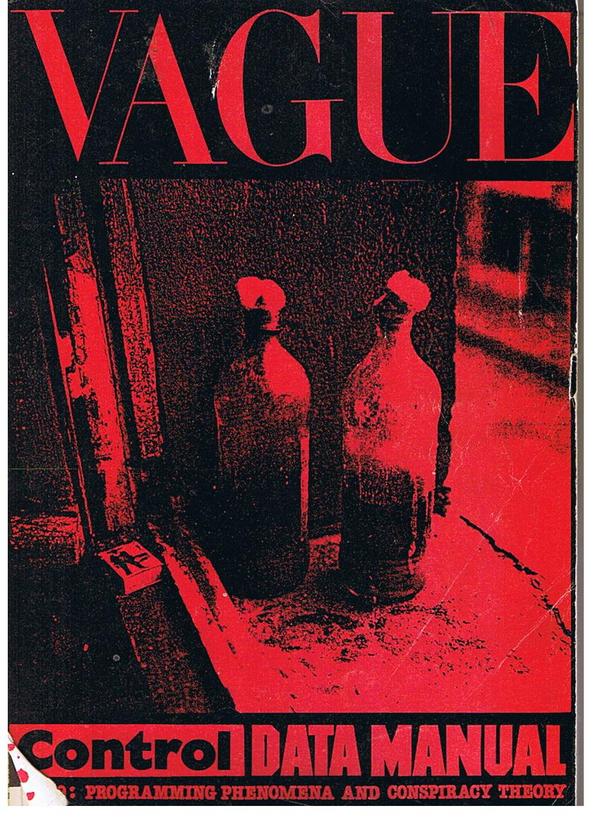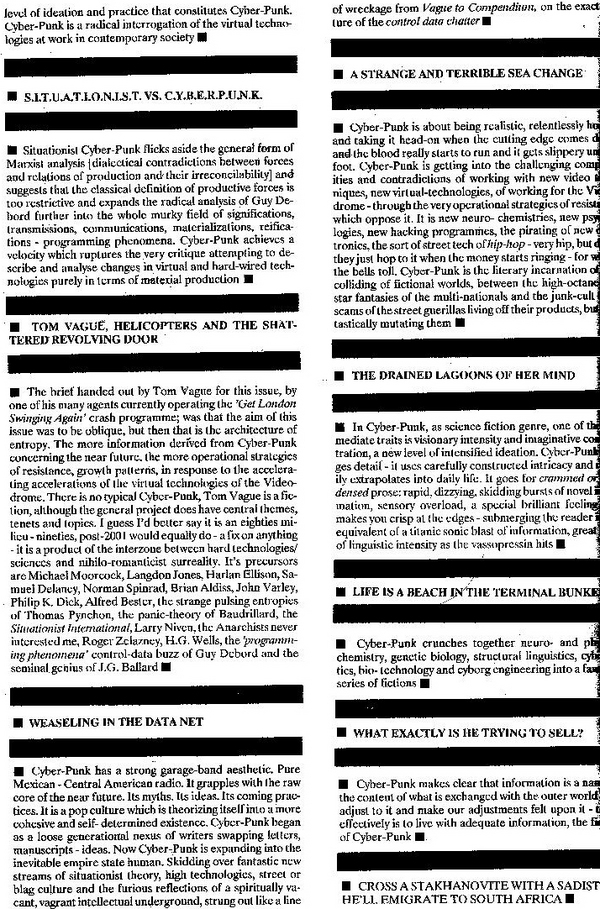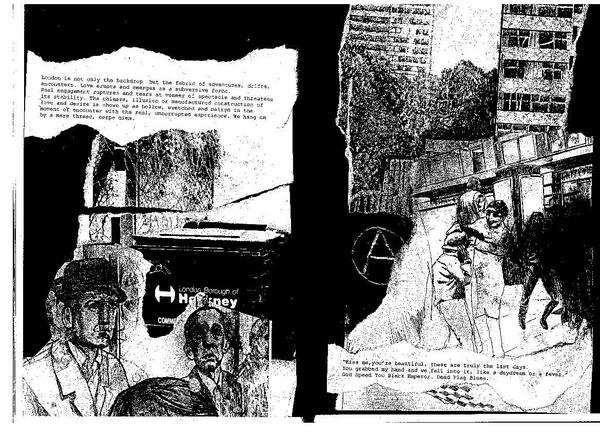August 17, 2007
'a rupturing of this collective amnesia'
- 'Tom Vague is a fiction...' (Mark Downham, Vague 21: Cyberpunk)
... or Tom Vague had fictionalized himself, casting himself as Willard in a comic strip version of Apocalypse Now set in late Cold War Stoke Newington, (and not entirely as a joke); or he had induced others to weave him into their fictions, fictions that he, TV, dole culture auto-didact, had himself published in zines that became much more than zines... (Of course he knew full well that - in an age of simulation which he had a better handle on than most - fictions were more than fictions...)
The small bands of interference realise they are totally unprepared for what lies ahead.
It's the mid-eighties. London before Starbucks. Deep into the perma-midwinter of white queen Thatcher's New Bad Dream, GB 84-85-86-87-88-89... Postwar labour has just died with the Miners' Strike; and, jeered along by a neurologically-damaged, military-Keynesian PKD-Ballard actor-president in the White House, the U.S.S.R. is set to self-destruct, with market Stalinism already preparing it to become a neo-liberal lab. All that is sold is melting into a cyberspace precorporated into Capital, but we have no idea how bad things are going to get.
- From punk to k-punk
Vague did... While all (other) eyes were on the rearview mirror - Very Old Media was being brutally cyberneticized at Wapping, the Old Left was already obligingly distintegrating into a nostalgia cult - Vague was absolutely of its time and therefore ahead of it. (As McLuhan said, a prophet is simply someone who can see what is right in front of them.) Excoriating rock und roll for failing in its millenarian promises, Vague had long since ceased to be a fanzine and had become a mutating (Control/Data/Cyberpunk) manual and videodrome console.
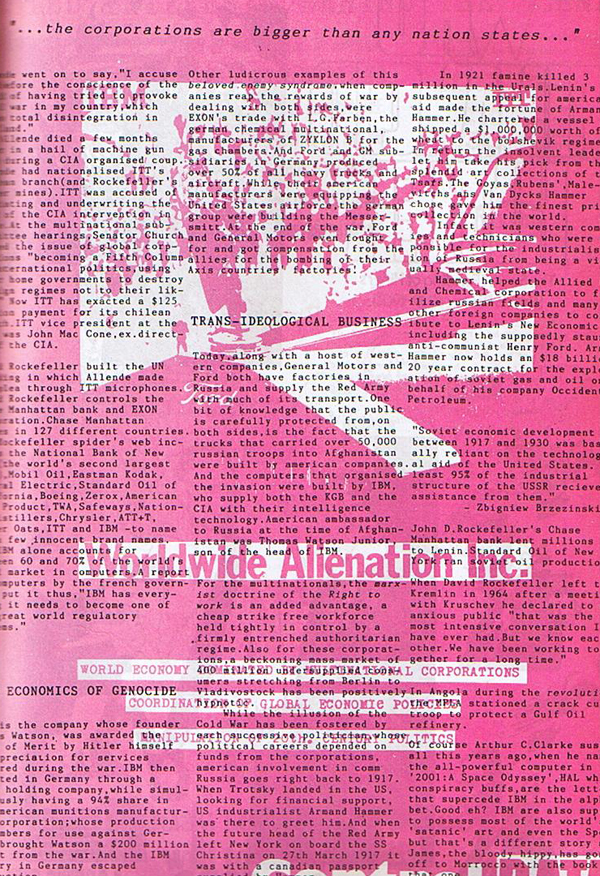
The pages, text and images teeming over one another, often with little regard for legibility, were like the visual analogue of Mark Stewart's As the Veneer of Democracy Starts to Fade (Stewart was himself a sometime contributor), fragmentary signal bleeding out through noise. Vague understood that the (70s) stand-off between Old Media and fanzines presaged a conflict that you are participating in now. Punk only mattered if it could become cyberpunk, which Vague knew had nothing to do with airbrushed Californian dreamin', and everything to do with Capital as super-sentient planetary monstrosity - 'the hugeness, the humming, a torrent of pure light, a semiotic web, a global nervous system thinking for itself' (Mark Downham, 'Cyberpunk') ... And k codes for cybernetics...
British cyberpunk was invented by pulp modernist bricoleur Mark Downham in the pages of Vague. Certainly, there would have been no Ccru without Downham's two treatises, 'Videodrome: the Thing in Room 101' and 'Cyberpunk', which, - years before such connections would be academic-rusted into familiarity - patched together Gibson, Debord, Moorcock, Tesla, Baudrillard, Apocalypse Now, in a form that accelerated what Ballard had done in The Atrocity Exhibition.
- From cyber-punk to hauntology
Cut to now, where the once crudely cut-and-pasted neo-liberal reality picture has stabilised and naturalised itself, positing itself as the terminal towards which the bullet train of history has always been heading. The only class war violence you will see on television is on re-runs of Billy Elliot. Rioting is unimaginable, but it's normal for fourteen year old black kids to be shot. Kapital Utopia UK.
Welcome to Liberty City....
I finally get to meet Tom Vague, sitting outside the re-located Chelsea College of Art on Millbank. Still as speed-thin as the old pix, only slightly greyer (aren't we all?) he's quiet as Kurtz, as withdrawn as you'd expect someone who is part fiction, part writer, to be. He has a writer's nerves about public speaking. I ask him what he's been doing, delighted that he's neither been invalided-out on some psych ward, nor incorporated into some nu-meeja niche, or worse - delighted, that is to say, that he's avoided the fates you fear for the casualties of capitalist realism's pacification program...
I'll find a key and try to get out of this dormitory
The latest version of Tom Vague is a psychogeographic tour guide. He's been invited to Chelsea by John Cussans to present a version of his meticulous, metamorphosing, sprawling pulp history of Notting Hill. Is this pysychogeography or hauntology?
In London, even the spectral streets are overcrowded. The air is thick with ghosts in Notting Hill... The shades of Jagger and Fox, who sleazed into each other and ended the Sixties in Performance, will always stalk Powis Square; the punky reggae party brewed up here, in the Ballard (High Rise/ Concrete Island) zone marked by the Trellick tower and the Westway, and some relics of that fission - Dub Vendor, the Rough Trade shop - still notionally survive, if now only the simulacrum-shell of their former selves. Vague tells us that the Trellick Tower haunted British culture even before it was built, Ian Fleming naming one of James Bond's most famous adversaries after of its architect, (Erno) Goldfinger. It's no accident that the Richard Curtis/ New Labour/ neo-liberal theme park - Vague calls it Notting Hell - has been erected here, the former site of so many riots and insurrections.
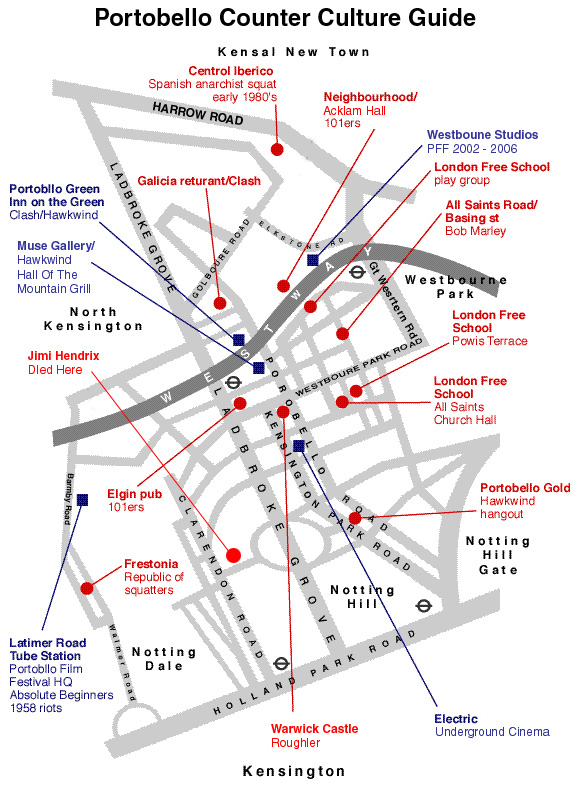
The point of TV's tour is to stir up the insurrectionary ghosts so that they contest the space, cultural as well as physical, now owned by middle mass poster boys for Brown's picture postcard London, open for business but closed to anything else. Tom Vague 2007 is much more forgiving to r and r than he was in 1987 (it was TV who said that Baader Meinhof was what W Germany had instead of punk. He says now that he used to regard Baader Meinhof as the real deal and the punk Thing as some commodified Spectacular distraction, but not any more...) The difference between the 80s and the 00s is perhaps the difference between mourning and melancholia. The Eighties counterculture was still flash-lit by the dimming afterglow of (post)punk, making the contrast between the promises of Then and the realities of Now all the keener. A new reality picture was being imposed, violently, but something else could still be remembered. After twenty years of capitalist realism, Thatcher's mantra - there is no alternative, a self-fulfilling prophecy feeding the seamless forcefield of the OedIPod - has gained in hyperstitional potency. The reason all these ghosts matter, the point of saying It wasn't always like this, is not that it was better then, let's go back, but to remind ourselves that it doesn't have to be this way... The ghosts that should most haunt us are the spectres of events that have not yet happened...
While waiting for Vague's talk, we meet another of London's hauntologists, Laura Oldfield Ford, the producer of Savage Messiah zine, now on its 8th issue. Each edition is devoted to a particular area of London, this time E8. Savage Messiah is like Heronbone with politics and pictures, Burial's London in words and image instead of sound. The collage form - text, photographs, Laura's own drawings - decomposes London from seamless, already-established capitalist reality into a riot of potentials, the city rediscovered as a site for drift and daydreams, a labyrinth of side-streets and spaces resistant to the process of gentrification and 'development' set to culminate in the miserable synchronized SF Capital festival of 2012.
- Perhaps it is here that the space can be opened up to forge a collective resistance to this neo liberal expansion, to the endless proliferation of banalities and the homogenising effects of globalization. Here in the burnt out shopping arcades, the boarded up precincts, the lost citadels of consumerism one might find the truth, and a new space opened up, there might be a rupturing of this collective amnesia.
Available from Savagemessiah[at]hotmail.co.uk
Posted by mark at August 17, 2007 11:06 AM | TrackBack